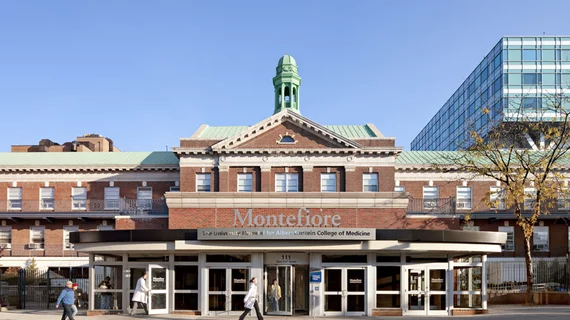UnitedHealthcare cuts noted academic system out of network, citing imaging costs 2-3 times local average
UnitedHealthcare has cut noted academic health system Montefiore and its 85-plus radiologists out of its network, citing imaging costs 2-3 times higher than other local providers.
An ultrasound exam, for instance, runs roughly $800 more than the average in New York City, while a CT is $2,200 more expensive and an MRI $4,000 pricier. After negotiations between the 10-hospital system and the nation’s largest commercial insurer broke down late last year, UHC officially carved Montefiore out on Jan. 1.
The Minnesota-headquartered company said it offered to keep the system on board through May 31 to avoid care disruptions.
“Unfortunately, Montefiore refused, unnecessarily disrupting access to its hospitals and physicians for thousands of New Yorkers,” UHC spokesman Cole Manbeck said in a statement. “Our top priority at this time is ensuring our members have access to the care they need and supporting them as they transition to one of the dozen hospitals and nearly 7,000 physicians remaining in our network in Bronx, Westchester and Rockland counties.”
On the other side, Montefiore noted that in the “final hours” of contract negotiations on Dec. 31, UnitedHealthcare asked for an extension, “without offering any good faith progress.” The health system said the payer has stalled talks since Nov. 19 and is “refusing” to respond to their latest proposal.
“We are disappointed by United’s decision to block 60,000 patients from seeing their trusted Montefiore doctors and hospitals while the pandemic continues to surge,” the health system said in a statement. “Our goal is to reach a fair resolution that restores in-network access and prevents further patient disruption. We hope United comes back to the table to meet this goal in the interest of protecting our patients and our communities.”
UHC has set up a lengthy webpage defending its decision, labeling Montefiore as “New York City’s most expensive health system.” There, it claims the provider was seeking an almost 30% price hike over the next three years that would amount to a roughly $200 million increase in costs for New York employers and families.
On its own website dedicated to the dispute, Montefiore maintained that it has invested $300 million in supplies and infrastructure responding to the pandemic. They’ve discharged more than 5,000 COVID-19 patients and saved more than 4,000 lives. Leaders also noted that, based on CMS data, Montefiore is in the top 15% of most cost-efficient academic hospitals in the U.S.
“Since the beginning, Montefiore has only asked for reasonable single-digit annual increases that are consistent with the rates we receive from every other major insurance company,” it said in the statement, estimating the increase at about $26 million annually. All told, the decision affects six of Montefiore’s hospitals in the city, with the exception of emergency services and those patients who apply and qualify for Continuity of Care.
The American College of Radiology highlighted the payment dispute (and a second between UHC and Envision Healthcare) in a recent update to its members.
“Montefiore and Envision both state that UnitedHealthcare refuses to negotiate in good faith during a pandemic, when providers are working harder than ever,” the college wrote Wednesday, adding that the ACR Payer Relations Committee is currently monitoring national insurance trends and their impact on patients’ access to care.

